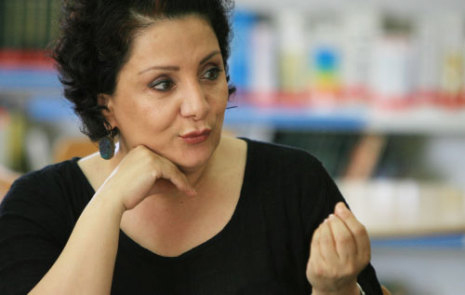Photo Credit of Najwa Barakat, www.fobyaa.com.
Oh, Salaam!
By Najwa Barakat, translated by Luke Leafgren
Interlink Books, 2015
In “Oh, Salaam!” Najwa Barakat tells a haunting story of post-war life in an unnamed Arab country — unmistakably similar to Lebanon — through the lens of two survivors, Luqman and Salaam. Both feel helplessly stuck in a monotonous existence that does not compare with the thrills of war. For Luqman, once a prosperous sniper who craves the fear and respect, as well as the wealth, he once enjoyed, life in his country has diminished to the act of seeking pleasure from the Russian prostitute Marina. Long since unemployed, he relies on the coffers of the lonely spinster Salaam, whose lover, the Albino, before meeting his demise, prospered alongside Luqman, as a warlord and torturer during the war. Meanwhile, Salaam, while attempting to entice Luqman into marriage, finds herself relegated to caring for the Albino’s mother, Lurice.
Luqman breaks their oppressive routine when he runs into his old friend, Najeeb, who, in addition to being an explosives expert, also served as the third former partner in the Albino’s profiteering crime ring. Najeeb convinces Luqman and Salaam to embark on a business together based on his idea, and soon Salaam and Najeeb begin a torrid affair, while Luqman seduces their first client, a French archaeologist named Shireen. Thus, before the winds change and their ambitions unravel, each appears to have fulfilled their desires in this war-ravaged city and nation.
Through graphic and vivid scenes of sadism and violence, Barakat evokes painful images of characters twisted in the wake of war. Natural acts and emotions, from suckling an infant at its mother’s breast to feelings of sexual arousal, take unnatural forms that reveal the psychological burdens each individual carries, an isolating force that warps their intentions, good and bad alike, leading to an inevitable downward spiral of self-destruction.
Disturbed by the brutal treatments the characters receive, and, in due measure, dole out, the reader feels captivated by revelations of humanity and vulnerability, while at the same time, feeling suffocated with the inexorable and accelerating pace of events. Given a front row seat to each character’s thoughts and intentions through revealing internal monologues, we wonder how differently we would act in similar circumstances.
Ms. Barakat has woven together a narrative, at once complex and straightforward, in which the grotesque becomes commonplace and shocking events cease to jolt us. Luqman and Salaam, have, as Luqman claims, “won the war against peace” as they fall into depravity, and we, the readers, become complicit in their war. “Oh, Salaam!”convicts us of our voyeurism while implicating us in the horrors of war with an unabashedly candid view of the lives it affects and corrupts. Barakat accomplishes all of this while avoiding the heavy-handed and didactic constructs that so easily diminish the impact of similar stories.
This article appeared in Al Jadid Magazine, Vol. 19, No. 68, 2015.
Copyright © 2015 AL JADID MAGAZINE

